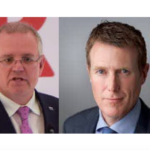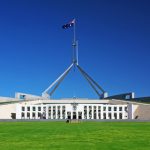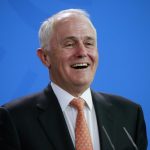PM Ignores Calls for a Federal ICAC, While Claiming to be a Champion of Freedom

“The people of NSW know that what was done to Gladys Berejiklian was an absolute disgrace,” Scott Morrison told parliament last Thursday. “The Australian people know that the former premier of NSW was done over by a bad process and an abuse of process.”
The PM was squirming his way out of a question asked by opposition leader Anthony Albanese, as to why more than one thousand days after he promised to deliver a federal anticorruption commission, he continues to drag his feet on the matter.
The inquiry came just hours after the Morrison government blocked a motion by Independent MP Helen Haines that attempted to put her private members bill – that seeks to establish a robust corruption oversight body – put on the agenda to be debated in parliament that day.
Albanese’s question also alluded to the government having released its draft legislation to establish an anticorruption commission in November last year, and despite it having gone through review, the final draft of the proposal – that was widely derided as a toothless watchdog – is yet to appear.
Morrison further responded that Labor doesn’t support the Coalition’s proposed integrity commission, suggesting that this is a reason the final bill hasn’t surfaced, and he added that Albanese would rather see the type of watchdog that led to the demise of Gladys Berejiklian.
Kicking against the ICAC
According to the prime minister, an anticorruption body that actually does its job is not something that would be appropriate for Canberra. And he likened the NSW Independent Commission Against Corruption (ICAC) to a “kangaroo court”.
Morrison then suggested that the ICAC had abused its powers and sullied Berejiklian’s reputation by looking into who her “boyfriend” was, rather than any “criminal conduct”. However, the revelations that have transpired from the ex-premier’s ICAC hearings reveal behaviour worthy of investigation.
Due to mounting pressure, the PM promised to create an anticorruption body in November 2018, just months before the last federal election. However, the Coalition’s draft bill didn’t surface until late last year after Haines had forced its hand by introducing her own integrity watchdog legislation.
In another attempt to get the repeatedly buried issue on the agenda, Haines moved to see her Australian Federal Integrity Commission proposal be debated by parliament on 25 November. And Labor, the entire crossbench, as well as Liberal MP Bridget Archer, supported her motion.
The vote saw 66 MPs vote in favour of the motion, with only 63 members, including the PM, voting against it. But due to a COVID-19 technicality, which involved restrictions preventing some MPs from being present, those who voted against the motion were ultimately successful.
The right to be a bigot
On the same day that the majority of MPs attempted to get the corruption watchdog up for debate, the PM introduced his pet project the Religious Discrimination Bill, which makes statements of belief currently outlawed by antidiscrimination laws legal when uttered in the name of one’s faith.
Prior to her momentous crossing the floor to oppose her own government on the corruption commission issue, Archer told the Guardian last Wednesday that she was “a bit offended, in a way, that we are prioritising… the Religious Discrimination Bill over an integrity commission”.
The Liberal backbencher further suggested that her government and the opposition should be working together on the Haines bill. Indeed, the calls for such a body are ever-increasing, especially as ongoing pork barrelling scandals have recently rocked the Morrison government.
Over the last two years, the Australian National Audit Office exposed the favourable distribution of public funds to Coalition and marginal seats in relation to sporting projects and commuter carparks in the lead up to the last federal election.
And the continuing stalling on establishing an integrity commission on the part of Morrison and other ministers reveals that they’re not interested in their conduct being scrutinised in relation to whether its tends towards the unlawful.
Rather, the Pentecostal PM prefers to push measures that would enshrine the right to be a bigot in the name of religion in law.
Trump-Lite
Morrison has lost a lot of face of late in terms of his performance regarding the French submarine deal, as well as at COP26.
On the international stage, French president Emmanuel Macron called him a liar, while in the domestic sphere, Senator Penny Wong likened his politicking to Donald Trump.
In keeping with the former US president, Morrison last week had what might be called his Charlottesville moment, as he responded to questions about Victorian protesters rallying around mock gallows and threatening to shoot the premier by saying he understood their frustration.
As Trump played down violent white supremacist protesters in the south of his country in 2017, Morrison implied that whilst the threats and intimidation on the part of demonstrators opposed to restrictions and vaccine mandates weren’t on, he empathised with their feelings that led to them.
“Of course, there are many people who are feeling frustrated,” the PM told the press on 18 November. “Our position on mandatory vaccines, for example, is in very specific circumstances. We’re not in favour of mandatory vaccines imposed by the government.”
However, Morrison was the politician who caused a furore early on in the pandemic when he announced to the public that it would likely be mandatory for everyone to get the COVID vaccine, and he was also behind the first vaccine mandate that was imposed upon aged care workers.
The freedom vote
With the pending election looming, and the PM’s approval rating plummeting, the Morrison government is scrambling to maintain numbers at the ballot box, and it’s introduced a number of US-style bills into parliament aimed at preventing votes against it.
Meanwhile, the Freedom movement has been picking up pace across the nation, and Morrison’s refusal to condemn the death threats made against not only Victorian premier Dan Andrews, but several crossbenchers, indicates that he’s trying to get these constituents onside.
When huge numbers of women turned up in Canberra earlier this year as part of the March for Justice, Morrison remarked that in other countries they might be shot, whereas when nooses were paraded and death threats were made in Melbourne last week, he understood ralliers’ frustrations.
“I have sympathy for Australians who have had a gutful of governments telling them what to do over the last two years,” the PM said before the cameras on 19 November.
Yet, Morrison seems to forget that he is the government. And in looking for governance, constituents expect a leader with a firm position.
And the PM’s constant stalling on inconvenient issues and his complete about-face on others is only serving to convey to the entire nation that we’re being governed by a gaggle of ministers with no substance.







